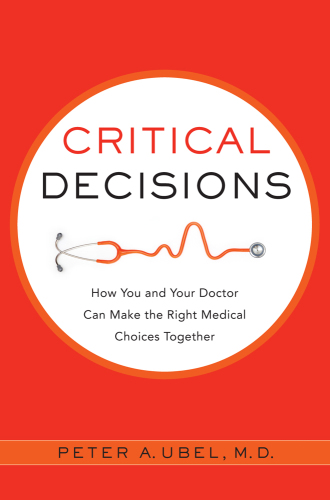
Critical Decisions
How You and Your Doctor Can Make the Right Medical Choices Together
چگونه شما و دکترتان میتوانید با هم انتخابهای پزشکی درست را انجام دهید
کتاب های مرتبط
- اطلاعات
- نقد و بررسی
- دیدگاه کاربران
نقد و بررسی

September 15, 2012
As Ubel (business administration & medicine, Duke Univ.; Free Market Madness: Why Human Nature Is at Odds with Economics--and Why It Matters) explains, while doctors are trained to diagnosis symptoms and recommend treatment, many are not trained in communication. This fact is at odds with a growing movement to encourage patients to work proactively with their physicians to determine their options. Ubel, a behavioral scientist and physician, uses examples, case studies, and personal accounts to explore the patient/doctor relationship. The process of making medical decisions is considered from the perspective of the patient and the physician. A doctor may believe he or she is explaining a condition or treatment option clearly, notes Ubel, but may nevertheless be unconsciously giving a biased opinion or using terminology the patient does not understand. Meanwhile, the patient may be too overwhelmed to ask for clarification. The section "Eight Tips To Help You and Your Doctor Make Better Decisions Together" consolidates the author's advice and makes for a helpful review before a visit to the doctor. VERDICT Written with clarity and a touch of humor, this is a quick and thoughtful read, a good choice for patients, and a must for medical professionals.--Susanne Caro, Univ. of Montana Lib., Missoula
Copyright 2012 Library Journal, LLC Used with permission.

September 15, 2012
In this passionate plea for patient empowerment, Ubel, a physician with a background in bioethics and behavioral science, promotes ways to assist people in making medical decisions. The best choices must always take into account a patient's particular values. Major obstacles to shared decision-making by patients and their doctors can include medical terminology (a language barrier), empathy deficit (physicians failing to grasp the emotional needs of patients), and the inability of patients to adequately understand medical evidence (e.g., to comprehend statistics). Ubel uses the stories of patients and his own clinical experiences to illustrate his points. An excellent chapter describes the treatment of his wife's invasive breast cancer along with the many medical questions and decisions that faced the couple. Ubel's advice to doctors is solid: Physicians need to offer recommendations with humility and in a manner that invites divergence of opinion. His suggestions for patients are equally sage: Be informed. Listen carefully. Ask questions. Get guidance from family, friends, and doctors. Don't rush big decisions. Always remember, you're not alone.(Reprinted with permission of Booklist, copyright 2012, American Library Association.)

























دیدگاه کاربران